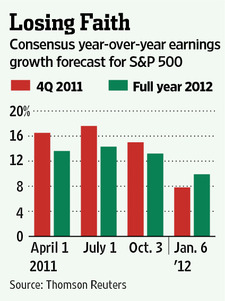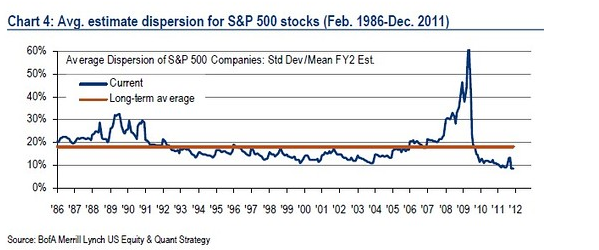The Wall Street Journal – Earnings Pessimism Could Be Overdone
Alcoa is the Iowa of companies. But like the decidedly mixed verdict from the first Republican caucus, its bellwether status these days is questionable. The aluminum giant kicked off earnings season Monday night with a fourth-quarter loss. That, though, has more to do with structural overcapacity in its industry. So the result offers limited guidance to markets. Granted, the result does reflect the gloomy mood hanging over earnings season. Alcoa was just one company to see its estimates slashed in the run-up to results. As of last Friday, S&P 500 fourth-quarter earnings per share were forecast at $24.31. That would represent 7.8% growth year-on-year, according to Thomson Reuters, down from an expected 15% at the start of October. What’s more, analysts expect earnings in the last three months of 2011 to decline quarter-on-quarter. That would be rare: S&P 500 fourth-quarter operating earnings have risen sequentially 80% of the time since 1948, according to Citigroup. Even stripping out volatile financial-sector results, it is unusual for fourth-quarter earnings to fall this way. As bad as that sounds, it may actually be a sign the pessimism surrounding earnings is overdone. Yes, uncertainty abounds about the strength of the economic recovery. But the fourth quarter was hardly a washout.
MarketBeat (WSJ Blog) – Herd On The Street: Company Analysts All In This Together
Is this what they mean by “consensus estimates”? Company analysts aren’t generally known for sticking their necks out, but this is getting ridiculous. In the lead-up to fourth-quarter earnings reports, analysts are more clustered than ever in their profits estimates, says Savita Subramanian of Bank of America-Merrill Lynch. According to her calculations, estimate dispersion for S&P 500 company earnings are now down below 10% — the lowest that figure has been since at least Feb. 1986 (check the chart). In other words, it’s been at least 25 years since analysts were in such close agreement about where earnings are likely to land. This unusual state of affairs suggests one of two possibilities:
(a) Wall Street analysts are so certain, and prescient, about where earnings are going to be that they’ve all naturally clustered around the correct figures; or
(b) Wall Street analysts have no idea what’s going to happen, given the magnitude of macroeconomic uncertainties, that they’re all cribbing each other’s notes and/or going with the safest, most middle-of-the-pack estimates they can muster.
Comment
FactSet Research Systems Inc. – Earnings Insight
Comment
The chart above shows the percentage of S&P 500 companies that report earnings above estimates in the earnings “pre-season” (cyan). The final percentage of S&P 500 companies that beat earnings estimates once all the number have been reported is shown in dark blue. The earnings “pre-season” takes place before Alcoa reports each year (which happened yesterday), the unofficial start of the earnings season.
A FactSet Research Systems Inc. research report dated December 23, 2011 noted that, of the 21 companies who actually report “pre-season” earnings, 57% beat the mean estimate for Q4 2011.
As the chart above shows, this is the lowest percentage since the end of the 2007 to 2009 “Great Recession.” FactSet also notes (page 4):
…. However, there is one trend in the data that may offer some predictive value for the Q4 2011 earnings season. In the nine quarterly “pre-seasons” where the percentage of companies reporting actual EPS above estimated EPS was below 80%, the final percentage of companies beating estimates was higher than the “pre-season” percentage for each quarter.
If history is any indication, we should expect the final number to be higher, but only marginally so. This suggests that this earnings season will have the smallest actual number of earnings beats since the end of the recession three years ago. In other words, this metric is suggesting a relatively poor earnings season.
Source:
Earnings Estimates
January 10, 2012
Bianco Research, L.L.C.





What's been said:
Discussions found on the web: